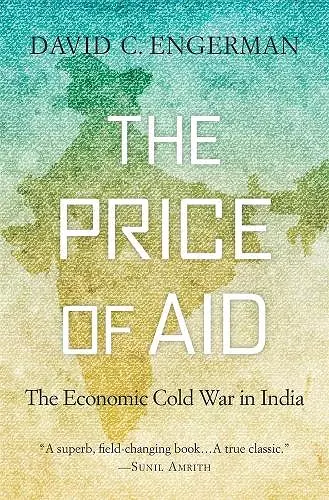The Price of Aid
The Economic Cold War in India
Format:Paperback
Publisher:Harvard University Press
Published:31st Jan '20
Should be back in stock very soon

“A superb, field-changing book…A true classic.”
—Sunil Amrith
“Makes a major contribution towards a necessary discussion of the politics of aid.”
—Times Higher Education
Debates over foreign aid are often strangely ahistorical. Economists argue about effectiveness—how to make aid work—while critics bemoan money wasted on corruption, ignoring the fundamentally political character of aid. The Price of Aid exposes the geopolitical calculus underpinning development assistance, and its costs.
India stood at the center of American and Soviet aid competition throughout the Cold War, as both superpowers saw developmental aid as a way of pursuing their geopolitical goals by economic means. Drawing on recently declassified files from seven countries, David Engerman shows how Indian leaders used Cold War competition to win battles at home, eroding the Indian state in the process. As China spends freely in Africa, the political stakes of foreign aid are rising once again.
“A magnificent book. Anyone who seeks to understand contemporary India and its development struggles will have to start here. Engerman’s work is not only enlightening, it turns much of what we thought we knew about India, foreign aid, and the Cold War in South Asia upside down.”
—O. A. Westad, author of The Cold War
“An outstanding history…Drawing on an unprecedented array of official and private archives in India, Russia, the United States, and Britain, Engerman offers a superb account—one that integrates the ideologies and policies of the superpowers with a sharp analysis of the push-and-pull of policymaking in India. This is a landmark study of independent India as well as the Cold War.”
—Srinath Raghavan, author of India’s War
The Price of Aid is a detailed and convincing historical study of the playing-out of the ideological and institutional politics of development aid… [It] makes a major contribution towards a necessary discussion of the politics of aid. -- Priyamvada Gopal * Times Higher Education *
A must read… Sheds significant light on the economic dimension of the Cold War… There is little doubt that this book will be essential reading for scholars of the Cold War, Indian history, and economic history. -- Tanvi Madan * H-Diplo *
Engerman shows the unintended effects of foreign aid by explaining how it weakened Indian political institutions and diminished the country’s exercise of sovereignty. -- R. M. Ramazani * Choice *
This is a superb, field-changing book. Based on a dazzling array of archives spanning continents, David Engerman has written a groundbreaking study of how the ‘economic Cold War’ shaped India—and how India shaped the Cold War. Global in scope but rooted in local detail, The Price of Aid is essential reading: a true classic of international history. -- Sunil Amrith, author of Crossing the Bay of Bengal: The Furies of Nature and the Fortunes of Migrants
The Price of Aid is an outstanding history of India during the Cold War and the political economy of foreign aid. Drawing on an unprecedented array of official and private archives in India, Russia, the United States, and Britain, Engerman offers a superb account—one that integrates the ideologies and policies of the superpowers with a sharp analysis of the push-and-pull of policymaking in India. This is a landmark study of independent India as well as the Cold War. -- Srinath Raghavan, author of India’s War: World War II and the Making of Modern South Asia
A magnificent book. Anyone who seeks to understand contemporary India and its development struggles will have to start here. Engerman’s work is not only enlightening, it turns much of what we thought we knew about India, foreign aid, and the Cold War in South Asia upside down. -- O. A. Westad, author of The Cold War: A World History
ISBN: 9780674241671
Dimensions: unknown
Weight: unknown
512 pages